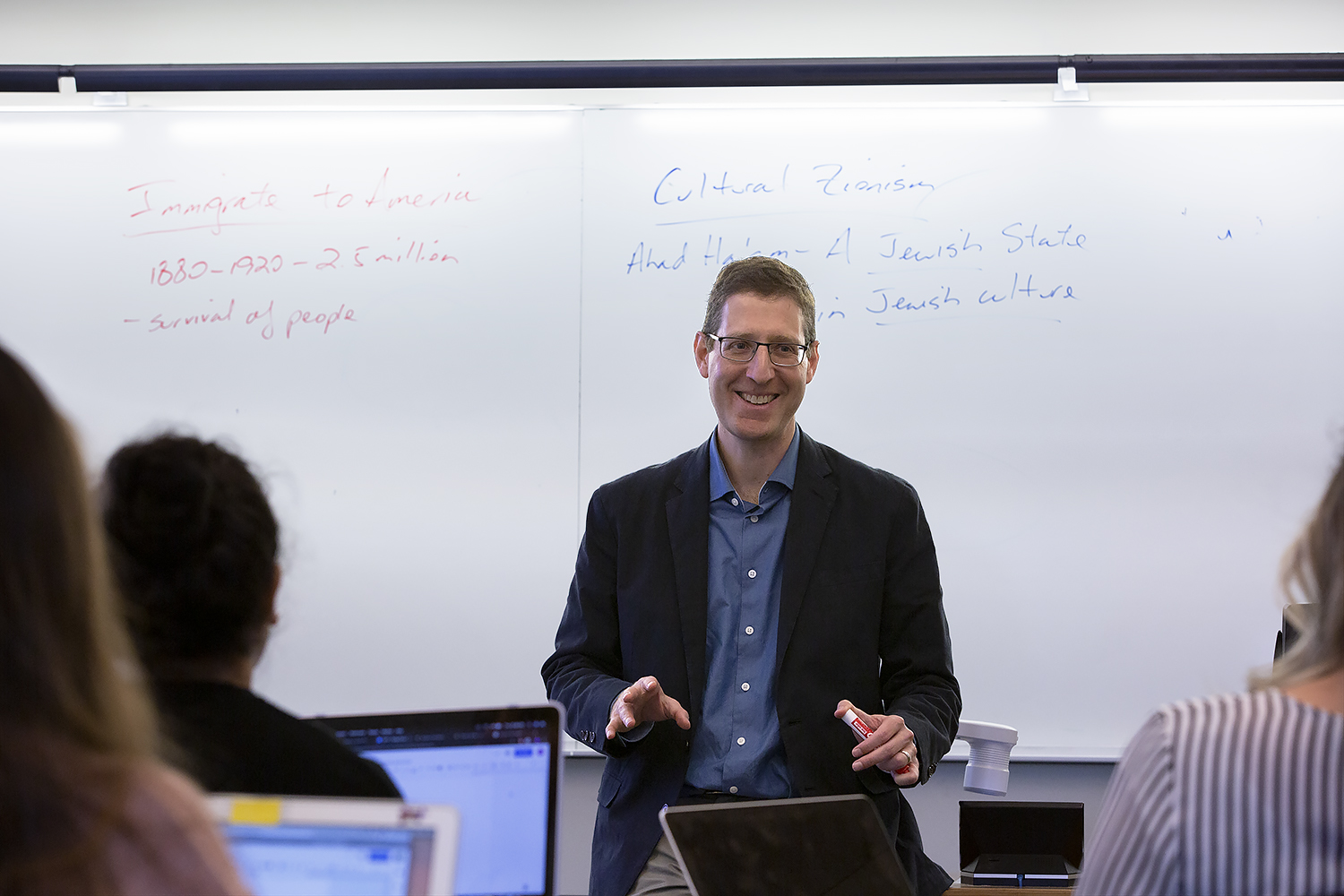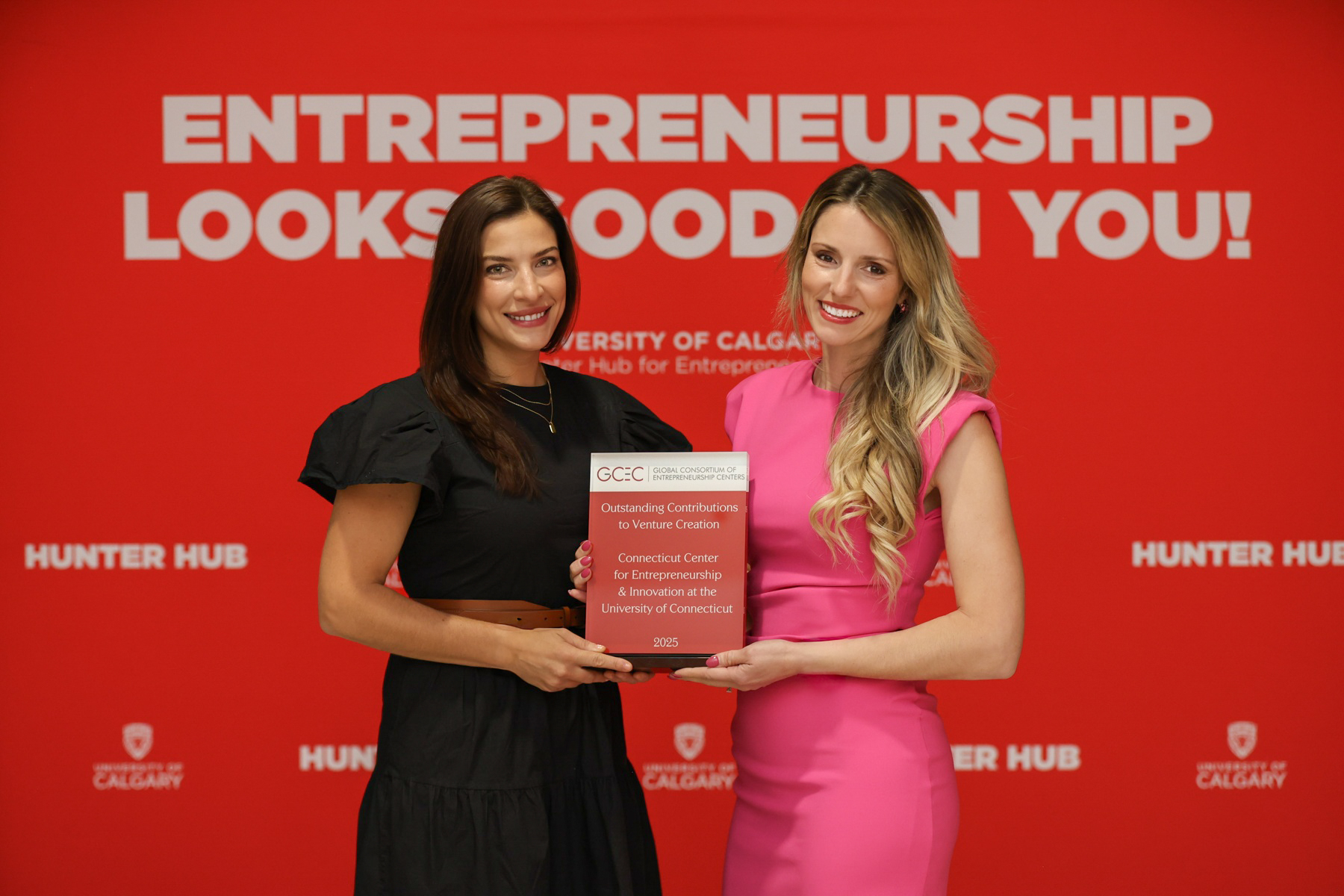Groucho Marx. Jerry Lewis. Gilda Radner. Larry David. Sarah Silverman. Amy Schumer.
What do these modern comedians have in common?
Go ahead…you can say it, encourages Avinoam Patt, new director of the Center for Judaic Studies and Contemporary Jewish Life. Being funny, he says, is an important part of Jewish history.
For example, the popular professor screens the slapstick Marx Brothers comedy, Duck Soup, in his course titled Jewish Humor.
“Students get to examine how humor works through Jewish culture,” he says. “As early as the 1930s, Jewish comedians like Groucho Marx are poking fun at fascist dictators.
“Which,” he notes wryly, “is always relevant.”
Patt joined UConn in August as the center’s third director and Doris and Simon Konover Chair of Judaic Studies. He follows on the legacy of nearly 40 years of Judaic studies at UConn, and sees a bright – and, yes, humorous – future for its researchers and students.
Growing up in Houston, as the son of Israeli immigrants who came to the U.S. for medical fellowships, Patt says that being both Jewish and a Texan grounded him in two very different worlds.
“For Jews, it’s an important question: Where is home?” he asks. “Most of my extended family is in Israel. What does it mean to live in exile?”
His love of Jewish history led to a gap year in his parents’ native country, where he studied in Jerusalem, did volunteer work, and worked on a kibbutz. Upon his return to the U.S., he attended Emory University, planning to be a doctor like his parents. But there, he met professors of Judaic Studies who showed him that he could study what he loved.
Patt wrote his dissertation at New York University on the importance of Zionism and Jewish identity for Jewish youth living in the diaspora. He then worked at the Holocaust Memorial Museum in Washington, D.C., and subsequently served as co-director of the Maurice Greenberg Center for Judaic Studies at the University of Hartford before arriving at UConn.
Patt sees himself in students in his courses like Modern Jewish Thought, Jewish Humor, and American Jewish Literature and Culture – not necessarily because they are Jewish, but because they are searching for an identity.
“Whatever my personal identity is, or whatever I’m trying to figure out, how does a minority group try to maintain their integrity as a distinctive culture, when also engaging with the modern world?” he asks. “That resonates across minority groups.”
As they moved from Eastern Europe to America, Jews in the U.S. became known as a humorous group, says Patt. And it’s not just Jewish immigrants – many contemporary comedians are from immigrant cultures.
“Humor can be an icebreaker for immigrants,” he notes. “It’s a way to introduce themselves, be unthreatening, and diffuse potential discrimination. Since they stand outside the majority culture, they can observe it and say, ‘Look, this is something funny about your society.’”
The field of Judaic Studies includes elements of history, literature, politics, religion, and cinema, and understanding all that background is incentivized in his classes – because if you don’t understand the culture, you won’t get the joke, says Patt.
Patt’s main research area is Holocaust studies, focused primarily on the experiences of survivors immediately after the war. His current book project analyzes how the Warsaw Ghetto Uprising, the largest revolt in a major city in occupied Europe, which became the focus of commemorations by Jews around the world during and after the war, was remembered and documented by the few surviving ghetto fighters.
Holocaust studies, he admits, might seem incongruous with his secondary interest in humor. But laughing can be a coping mechanism during times of oppression, and Patt has fused the two in studies about the survival of humor among Jews during and after the Holocaust.
His forthcoming co-edited book, Laughter After: Humor and the Holocaust, examines the ethics, boundaries, and outcomes of representing the Holocaust with humor in the decades that have followed World War II. In the book, Patt compares Israeli and American sketch comedy about the Holocaust – there is quite a lot of it, he says – to try to determine the boundaries for invoking humor in the Holocaust context.
The Center for Judaic Studies and Contemporary Jewish Life has a mission that includes research studies, undergraduate and graduate student learning, and community outreach. As director, Patt follows on the paths created by founding director, Professor Emeritus of Sociology Arnold Dashefsky, and most recent director, Vice Provost for Academic Operations Jeffrey Shoulson – the latter with whom he co-created humor classes taught at UConn and the University of Hartford. Associate Professor of Literatures, Cultures and Languages Sebastian Wogenstein served as interim director of the Center in 2017-19.
Patt plans to ramp up the center’s commitment to outreach with programming, including lectures, film screenings, book events, and exhibits. In particular, he is committed to holding workshops to help teachers develop their skills in teaching about the Holocaust and other genocides, which was recently made a curricular requirement for Connecticut schools.
He also wants to expand the Judaic Studies undergraduate program to include more majors and minors. He hopes to employ his singular teaching style and the popularity of the other Hebrew and Judaic Studies faculty to increase awareness about the Judaic Studies major and minor programs, while also recruiting graduate students to the MA and Ph.D. programs in Judaic Studies.
“Our classes are so interdisciplinary, and really emphasize classroom discussion and engagement,” he says. “I don’t need my students to memorize every single detail. I want them to think and develop arguments, and that will serve them well.”
He hopes that classes like his Jewish Humor course, which holds a waitlist every semester, will help to spread the word. But when asked if he considers himself a funny person, he hedges.
“I definitely use humor in my teaching…but don’t expect me to show up at a party and start telling jokes,” he says.



